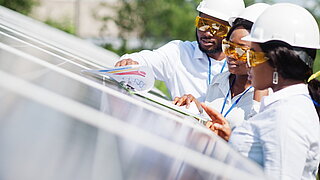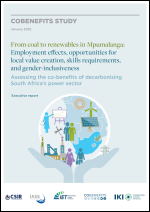Energy policy turnaround inclusion of gender equality

Women are underrepresented in the energy sector worldwide. A turnaround in energy policy can also be a move towards gender-equality in terms of career opportunities.
The energy sector is a man’s world: until recently, the share of women in top management positions made up only 1 per cent and 6 per cent of technical employees in the fossil energy sector worldwide (Baruah, 2017).
The share of women in the renewable energy industry has grown over the last ten years and amounts to about 32 per cent in 2019 (IRENA, 2019). However, as far as technical, managerial and political positions in this sector are concerned, men still outnumber women. But the turnaround in energy policy is a source of hope: besides its contribution to coping with climate change, increased focus is being placed on socio-economic benefits such as green jobs, higher levels of income, affluence, and involvement in society.
 Graphic
Graphic
Breaking away from traditional gender roles: an opportunity for the turnaround in energy policy
For the turnaround in energy policy to achieve worldwide social acceptance, women need to benefit from these opportunities in the same way that men do. The predominantly high share of men in the energy sector, in particularly in decision-making positions, raises issues related to gender equality, the observation of various interests and life circumstances, universal energy access and opportunities for involvement.
Apart from these ethical issues, the neglect of career opportunities for women in the energy sector also prevents the exploitation of the full economic potential of the working population. Even if the turnaround in energy policy should lead to new career opportunities for women in the industry, targeted political and entrepreneurial actions are necessary in order to break through the “glass ceiling” in the male-dominated energy sector.
 Graphic
Graphic
Recommendations for the promotion of gender-equitable careers in the energy sector
In order to pave the way for gender-equitable careers in the renewable energy sector and achieve the associated social and economic opportunities, five fields of action need to become the centre of attention:
- Sensitisation and vocational counselling;
- Proficiency and qualification;
- Recruitment;
- Working environment;
- Mentoring and role models.
The short study Green Employment for Women (IASS 2021) of the IKI project COBENEFITS pursues these five “fields of action".
In contrast to the areas of coal mining or fossil-based power generation, in which male-dominated structures have been firmly embedded for many decades, the relatively young renewable energy sector creates career opportunities for women. It is however necessary to first identify and overcome existing barriers, for instance in South Africa, where women account for only 14 per cent of staff in the renewable energy sector according to the sobering results of the COBENEFITS study From coal to renewables in Mpumalanga (IASS/CSIR/IET 2022=.
The study analyses hurdles for women in the energy sector in Mpumalanga, the centre of South Africa’s coal-mining industry. One of the hurdles is the fact that women in this area have children at a young age. Subsidised childcare facilities in the vicinity of training centres would enable young parents to reconcile their parental obligations and their vocational development.
The study also comes to the conclusion that there is a lack of entrepreneurial capacities in the region, in particular in terms of small-scale businesses. This field is also dominated by men, resulting in women having less access to markets and networks. Training in business management for women could contribute to stopping the exclusion of women and hence to closing the existing gap.
“We must grasp the opportunity to stop women from gaining the impression that the renewable energy sector is dominated by men (although this is still largely the case). Perception frequently creates hurdles that reach far beyond reality.” Brian Day, Research team leader COBENEFITS Study South Africa
The link has been copied to the clipboard
Contact
IKI Office
Zukunft – Umwelt – Gesellschaft (ZUG) gGmbH
Stresemannstraße 69-71
10963 Berlin
Project publications on the topic
Green employment for women – Towards gender-inclusive renewable energy careers








